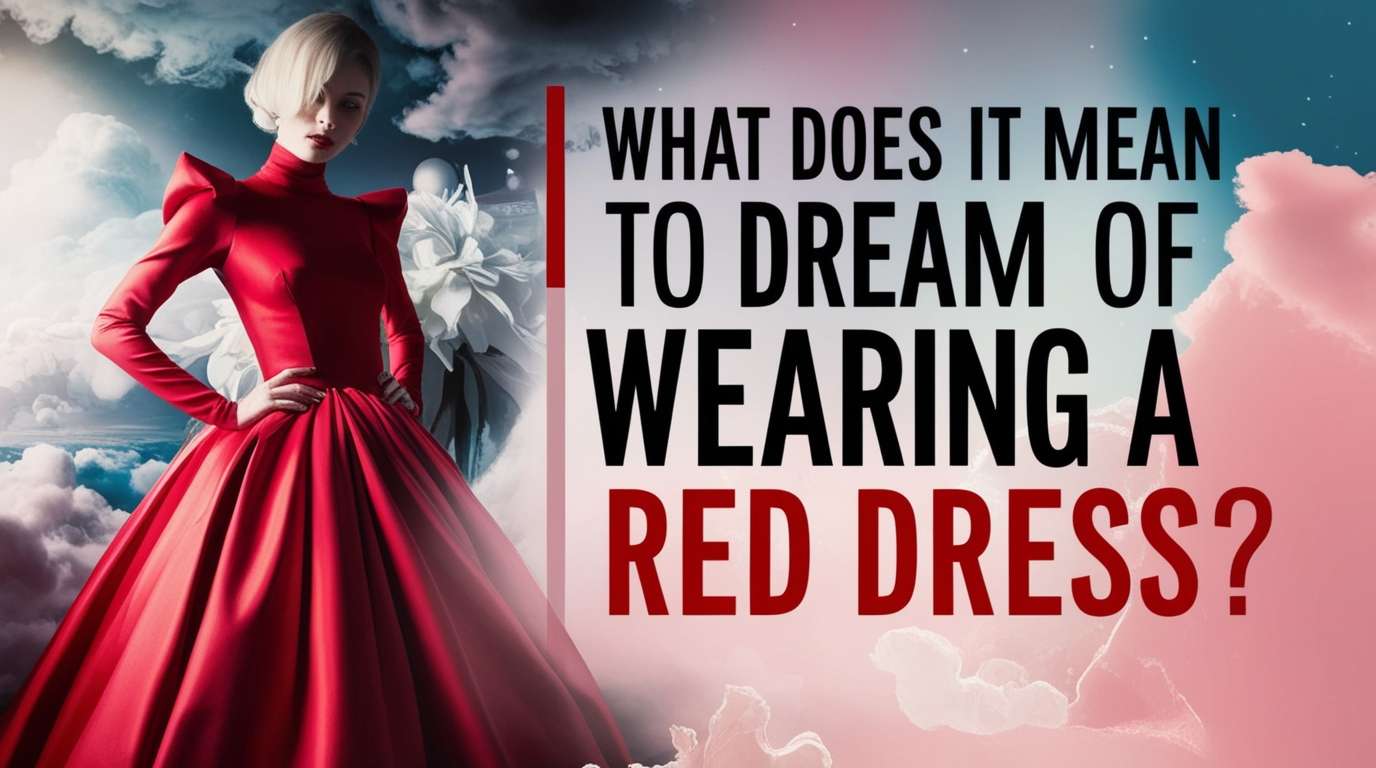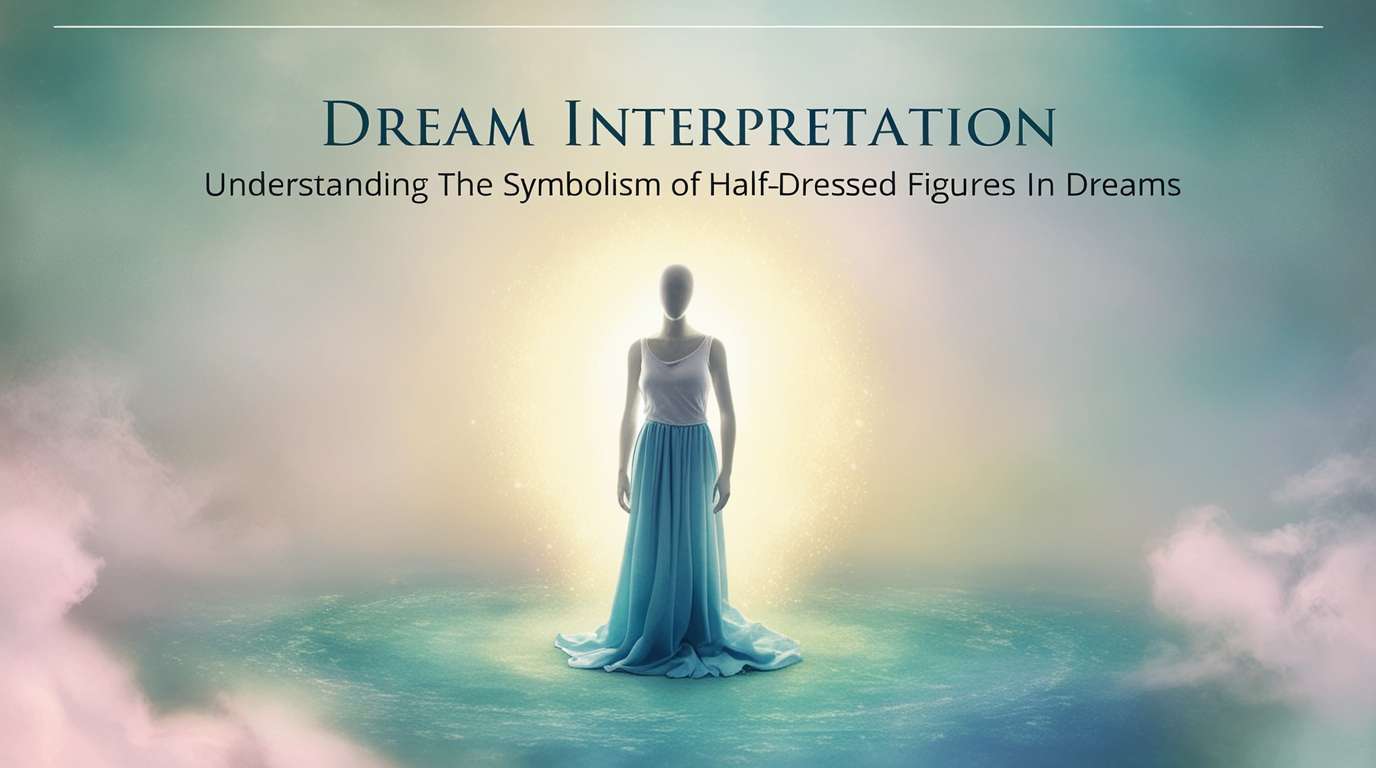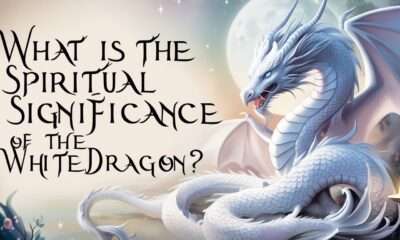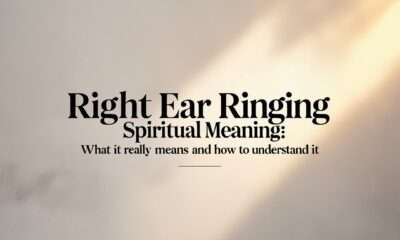Dream Meanings
What does it mean to dream of wearing a red dress?

Do you often find yourself dream of wearing a red dress? Dreams have long been thought of as a gateway to our subconscious mind, revealing hidden thoughts and emotions. In the realm of dream interpretation, the color red holds significant symbolism, representing passion, power, and desire. When it comes to dreaming of wearing a red dress, the imagery can hold deep and profound meaning.
Table of Contents
Why am I dreaming of wearing a red dress?
The color red is often associated with strong emotions such as love, anger, and excitement. When you dream of wearing a red dress, it may indicate that you are feeling passionate or confident in your waking life. This dream could be a reflection of your inner desires and ambitions, symbolizing a newfound sense of empowerment and courage.
Additionally, the color red is also connected to the root chakra, which is located at the base of the spine and is associated with our sense of security and stability. Dreaming of wearing a red dress could signify a need for grounding and self-assurance, as well as a desire to assert your presence and stand out in a crowd.

What does the red dress symbolize in dreams?
In the realm of dream symbolism, clothing often represents our outward persona and how we present ourselves to the world. The color red, in particular, is often associated with intensity, passion, and sensuality. When you dream of wearing a red dress, it may symbolize your desire to be noticed and admired, as well as your willingness to embrace your own uniqueness and individuality.
Furthermore, the act of wearing a dress in a dream can represent femininity, grace, and elegance. Dreaming of wearing a red dress could indicate a desire to reconnect with your feminine energy and explore aspects of your personality that are typically associated with the feminine archetype.
What emotions are associated with dreaming of wearing a red dress?
Dreams are often a reflection of our innermost thoughts, feelings, and emotions. When you dream of wearing a red dress, the color red may evoke various emotions such as passion, excitement, or even anger. This dream could be a manifestation of your innermost desires and longings, as well as your need to express yourself more boldly and assertively.
Addition to that, the act of wearing a dress can symbolize vulnerability and openness. Dreaming of wearing a red dress may indicate a willingness to be more vulnerable and authentic in your relationships and interactions, as well as a desire to attract attention and recognition for your unique qualities.

What other factors should I consider when interpreting dreams of wearing a red dress?
When it comes to dream interpretation, it’s important to consider the context of the dream, as well as any other symbols or images that may appear. Pay attention to how you feel while wearing the red dress in your dream—are you confident and empowered, or do you feel uncomfortable and exposed?
Additionally, consider the specific style and design of the red dress. Is it elegant and refined, or bold and daring? The style of the dress can offer further insights into your own personality and how you wish to be perceived by others. Ultimately, the meaning of dreaming of wearing a red dress is deeply personal and can vary depending on your own thoughts, feelings, and experiences.
How can I harness the power of dreams of wearing a red dress in my waking life?
If you find yourself dreaming of wearing a red dress, it may be a sign to embrace your inner passion and confidence in your waking life. Consider ways in which you can tap into your own strength and assertiveness, whether it be through creative pursuits, personal relationships, or professional endeavors.
Additionally, use the symbolism of the red dress to explore and express your own unique identity. Embrace your femininity and sensuality, and allow yourself to shine brightly in all aspects of your life. Remember that dreams are a powerful tool for self-discovery and personal growth, so take the messages from your dream of wearing a red dress to heart.

Conclusion
Dreaming of wearing a red dress can hold deep and meaningful symbolism, representing passion, power, and desire. The color red is associated with strong emotions and the root chakra, suggesting a need for grounding and self-assurance. When interpreting dreams of wearing a red dress, consider the context, emotions, and personal significance to uncover the message hidden within.
What Does a Cut Symbolize Spiritually?
FAQs
1. Can dreams of wearing a red dress predict the future?
Dreams are not necessarily predictors of the future, but rather reflections of our inner thoughts and emotions. Dreams of wearing a red dress may symbolize passion and empowerment in the present moment, rather than foretelling specific events or outcomes.
2. What if I feel uncomfortable wearing a red dress in my dream?
Feeling uncomfortable while wearing a red dress in a dream could indicate underlying issues with confidence or self-expression. Use this dream as an opportunity to explore and address any feelings of insecurity or vulnerability that may be holding you back in your waking life.
3. How can I enhance my dream recall to better interpret dreams of wearing a red dress?
Keeping a dream journal and practicing mindfulness techniques can help improve your dream recall and enhance your ability to interpret the symbolism within your dreams. Pay attention to recurring themes and emotions in your dreams, and reflect on how they may relate to your waking life.
4. What if I dream of wearing a red dress in a different setting or context?
The setting and context of a dream can offer valuable insights into the underlying meaning of wearing a red dress. Consider how the environment and other symbols in the dream may influence the interpretation of the red dress, and reflect on how they contribute to the overall message of the dream.
5. Can dreams of wearing a red dress have a spiritual significance?
Dreams of wearing a red dress can have spiritual significance, as the color red is often associated with the root chakra and our connection to the physical world. Embrace the symbolism of the red dress as a symbol of passion, power, and desire, and use it as a tool for self-discovery and personal growth on a spiritual level.
Dream Meanings
Snake in Dreams: Spiritual Meaning and Ancient Symbolism Explained

Dreams shape the way we think about ourselves and the world. They reveal symbols that carry deep meaning, and few are as powerful as the snake. When a snake in dreams appears, it is never ordinary. The image feels charged, often unsettling, and rich with symbolism. For thousands of years, snakes have represented transformation, healing, temptation, wisdom, and hidden truths.
This will explore why snakes in dreams leave such a strong impression, what spiritual traditions say about them, and how to interpret their presence in modern life.
Table of Contents
Why a Snake in Dreams Feels So Powerful
The emotional impact of a snake dream is often stronger than the details. People remember the fear, awe, or curiosity more vividly than the setting. This is because snakes are universal symbols. In nature, they are unpredictable and dangerous, and in culture, they are tied to mystery and transformation. A snake in dreams brings that energy directly into the subconscious.
For some, the image feels threatening. For others, it brings peace or renewal. Either way, the dream tends to stay with you, demanding attention and interpretation.

Spiritual Meaning of Snake in Dreams
Spiritually, snakes in dreams often carry four core messages:
- Transformation: The shedding of skin represents growth and new beginnings.
- Healing: The serpent has long been a sign of medicine, health, and recovery.
- Life energy: In Hinduism, kundalini energy is depicted as a coiled snake rising through the spine.
- Hidden truths: Snakes bring forward what is usually kept in the shadows.
These meanings show that a snake dream can be more than fear—it may signal growth or awakening.
Common Interpretations of Snake Dreams
The way the snake behaves in your dream adds meaning:
- Snake bite: A sharp wake-up call, possibly a warning about health, betrayal, or urgency.
- Snake shedding skin: Symbol of rebirth and leaving old patterns behind.
- Calm snake: Wisdom, controlled power, or peace with your instincts.
- Killing a snake: Taking back control or ending something toxic in life.
- Snake in water: Deep emotions surfacing, often feelings you’ve avoided.
- Snakes in the house: Personal or family issues needing attention.
- Multiple snakes: Overwhelm, too many pressures or conflicts.
The details matter. A snake in dreams never arrives without context.
Ancient Symbolism of Snake in Dreams
Understanding cultural history helps explain why a snake dream feels so significant.
- Egypt: The cobra represented divine protection and power.
- Greece: The staff of Asclepius with a snake symbolizes medicine and healing.
- India: Snakes are sacred, tied to fertility, wisdom, and kundalini energy.
- Abrahamic religions: The snake often represents temptation and testing.
- China: The snake zodiac sign symbolizes intuition and intelligence.
- Mesoamerica: Quetzalcoatl, the feathered serpent, embodied wisdom and creation.
Every culture gave the snake deep meaning—sometimes protective, sometimes dangerous, but never neutral.

Psychological View of Snake in Dreams
Beyond spirituality, psychology offers another lens. Carl Jung described snakes as symbols of the unconscious and the shadow self. Dreaming of snakes may point to:
- Repressed fears or desires.
- Instincts you have ignored.
- Inner transformation preparing to surface.
In this way, a snake in dreams acts like a mirror, showing what is hidden inside the self.
The Importance of Emotions and Context
Two people can dream of snakes and interpret them very differently. That’s why your feelings in the dream are key.
- Fear suggests avoidance or denial.
- Calmness suggests growth or readiness.
- Relief suggests healing and acceptance.
The color of the snake adds further meaning. Black often symbolizes mystery, white signals clarity, red is tied to passion, green to healing, yellow to confidence, and blue to truth. Context—your feelings, the setting, and the action—shapes the dream’s meaning more than the symbol alone.
When Snake Dreams Repeat
Repeating snake dreams are particularly important. They suggest your subconscious is trying to deliver a message you have not yet understood. If the dream repeats with intensity, it may be warning you to act. This could involve addressing a relationship, health matter, or emotional truth you’ve ignored.
A recurring snake in dreams is not random—it’s persistent.

How to Interpret Your Own Snake Dream
To work with your dream, begin by recording it as soon as you wake. Write down details such as the color, setting, and your feelings. Then ask direct questions:
- What am I avoiding?
- What needs to change in my life?
- What part of me is ready for renewal?
This practice turns the dream into a guide. Snakes in dreams may seem threatening, but they are often invitations to grow.
Why a Snake in Dreams is a Sign of Growth
Despite fear, snakes in dreams often point toward progress. Transformation, healing, and awakening are at the heart of their symbolism. Even when the dream feels negative, it may be pushing you to confront what is necessary for growth. A snake dream does not simply warn—it challenges and encourages.
Conclusion
A snake in dreams is one of the most enduring and meaningful dream symbols. Across time and culture, snakes have represented transformation, healing, temptation, wisdom, and spiritual energy. When a snake appears in your dream, it is a call to pay attention.
The meaning depends on context: how you felt, where the snake appeared, and what it did. Sometimes it signals growth, sometimes a warning, and sometimes deep healing.
What remains constant is this: the snake is never meaningless. It is a powerful messenger, urging you to reflect, to face fears, and to embrace the changes unfolding in your life.
Awaken Your Spiritual Intuition NOW: Decode Divine Guidance This Fall!
Dream Meanings
What Does It Mean When You See a Stink Bug? Discover the Spiritual Significance

Stink bugs are often seen as nuisances due to their foul odor when disturbed. However, in the realm of spirituality, their presence can carry deeper meanings and symbolisms. Discover the spiritual significance behind encountering a stink bug in this article.
Table of Contents
What does it mean when a stink bug crosses your path?
Seeing a stink bug cross your path can be a sign of protection and resilience. In some cultures, stink bugs are believed to be spiritual guardians, guiding and watching over individuals in times of need. Their presence may indicate that you are being protected from harm or negative energies.
Additionally, stink bugs are known for their ability to emit a strong odor as a defense mechanism. This can serve as a reminder to protect yourself and set healthy boundaries in both your physical and spiritual life. The stink bug crossing your path may be urging you to fortify your defenses and stand strong in the face of challenges.

What does it symbolize when a stink bug appears in your dreams?
Dreams involving stink bugs can carry messages of resilience, perseverance, and self-protection. The appearance of a stink bug in your dreams may symbolize your need to shield yourself from negativity and harmful influences in your waking life.
Alternatively, the stink bug in your dream could represent your own inner strength and ability to overcome obstacles. It may be a gentle nudge from the universe to tap into your resilience and trust in your ability to navigate through difficult situations.
How does the spiritual significance of a stink bug relate to personal growth?
The spiritual significance of a stink bug can be tied to the theme of personal growth and transformation. Encountering a stink bug may indicate that you are on the brink of a period of growth and renewal.
Just as the stink bug sheds its old exoskeleton to allow for growth, you too may need to shed old habits, beliefs, or thought patterns that no longer serve you. Embracing the symbolism of the stink bug can help you navigate through this process of shedding the old and welcoming the new.

Can the appearance of multiple stink bugs hold a different spiritual meaning?
When multiple stink bugs appear in your surroundings, it may signal a need for increased protection and vigilance. The presence of numerous stink bugs may indicate that you are facing a particularly challenging or energetically heavy time.
It could also serve as a reminder to reinforce your boundaries and take measures to protect your energy from being drained or affected by external influences. Pay attention to the areas of your life where you may need to strengthen your defenses and seek support if necessary.
What should you do if you encounter a stink bug in your meditation or spiritual practice?
Encountering a stink bug during your meditation or spiritual practice can provide an opportunity for reflection and introspection. Rather than viewing it as a disruption, consider it as a message from the spiritual realm.
Take a moment to tune into the energy of the stink bug and reflect on what it may be trying to communicate with you. It could be a reminder to stay grounded, maintain your boundaries, or tap into your inner resilience as you delve deeper into your spiritual journey.

How can you incorporate the spiritual significance of a stink bug into your daily life?
To integrate the spiritual significance of a stink bug into your daily life, you can start by being more mindful of your surroundings and the messages that nature conveys. Take note of any encounters with stink bugs and reflect on their symbolism in relation to your current circumstances.
Additionally, you can use the presence of a stink bug as a prompt to strengthen your boundaries, protect your energy, and embrace growth and transformation. By incorporating the lessons of the stink bug into your daily practices, you can deepen your spiritual awareness and enhance your personal growth journey.
Conclusion
While stink bugs are commonly associated with their unpleasant odor and intrusive presence, delving into their spiritual significance reveals a deeper layer of meaning. By interpreting the symbolism of a stink bug, you can gain insights into protection, resilience, personal growth, and transformation. Embrace the lessons that the stink bug offers and let its presence guide you on your spiritual journey.
What is the Spiritual Significance of Cowrie Shells?Discover the truth
FAQs
1. Can stink bugs harm you spiritually?
Stink bugs themselves do not have the ability to harm you spiritually. Their presence is more about the messages and symbolism they carry rather than causing harm.
2. Are stink bugs a sign of good luck?
In some cultures, stink bugs are considered a symbol of protection and resilience, which can be interpreted as a form of good luck. However, their appearance may have different meanings based on individual beliefs and interpretations.
3. How can I differentiate between a regular bug and a stink bug spiritually?
When determining the spiritual significance of encountering a bug, it’s essential to tune into your intuition and pay attention to the thoughts and feelings that arise. If a particular bug, such as a stink bug, stands out to you and triggers a sense of importance or symbolism, it may be worth exploring its spiritual significance.
4. Can I communicate with stink bugs spiritually?
While you may not be able to communicate with stink bugs in the traditional sense, you can be receptive to the messages and symbolism they carry. Through observation, reflection, and intuition, you can glean insights from the spiritual significance of encountering a stink bug.
5. What should I do if I have a fear of stink bugs but want to explore their spiritual significance?
If you have a fear of stink bugs, it’s essential to approach their spiritual significance with caution and at your own pace. Consider starting by researching their symbolism from a safe distance and gradually incorporating their lessons into your spiritual practice as you feel more comfortable.
Dream Meanings
What Does It Mean When You Dream of Someone Else Being Half Dressed?

A common dream that many people experience is dreaming of someone else being half dressed. This dream can often leave a person feeling confused or unsettled upon waking. In the realm of dream interpretation, this type of dream holds various meanings and symbolism. Understanding what it means when you dream of someone else being half dressed can provide insight into your subconscious thoughts and emotions.
Table of Contents
What does it mean when you dream of someone else being half dressed?
Dreaming of someone else being half dressed can symbolize vulnerability and feelings of exposure. It may suggest that there are hidden aspects of the person’s character or emotions that are being revealed. This dream could also indicate a lack of readiness or confidence in a certain situation. Seeing someone half dressed in a dream may reflect a sense of embarrassment or discomfort in revealing one’s true self.
On the other hand, dreaming of someone else being half dressed could also represent intimacy and connection. It might signify a desire for a deeper emotional bond with that person or a need for more open communication. This dream could point towards the need for honesty and authenticity in relationships. Overall, dreaming of someone else being half dressed is a symbol of vulnerability, intimacy, and self-expression.

What are the spiritual implications of dreaming of someone else being half dressed?
In a spiritual context, dreaming of someone else being half dressed can have deeper meanings. It may symbolize the stripping away of societal masks and false pretenses to reveal one’s true self. This dream could be a sign of spiritual awakening and a call to authenticity. It may also signal a need for vulnerability and openness in spiritual relationships and connections.
Furthermore, this dream can represent the concept of self-acceptance and self-love. It may suggest that the dreamer needs to embrace all aspects of themselves, including their vulnerabilities and insecurities. Dreaming of someone else being half dressed in a spiritual context could be a reminder to practice compassion and understanding towards oneself and others.
How can dreams of someone else being half dressed be interpreted in relation to personal relationships?
When it comes to personal relationships, dreaming of someone else being half dressed can indicate a need for honesty and transparency. It may suggest that there are hidden truths or emotions within the relationship that need to be addressed. This dream could signify a desire for deeper emotional intimacy and connection with the other person.
On the flip side, dreaming of someone else being half dressed may highlight feelings of vulnerability or insecurity within the relationship. It could reveal a fear of being exposed or judged by the other person. This dream might serve as a reminder to communicate openly and authentically in relationships in order to foster trust and understanding.

What psychological factors play a role in dreams of someone else being half dressed?
Psychologically, dreaming of someone else being half dressed can uncover hidden feelings of inadequacy or insecurity. This dream may stem from a fear of being judged or not measuring up to societal standards. It could reveal deep-seated emotions of shame or embarrassment that need to be addressed.
This dream may also indicate a need for self-acceptance and self-expression. It could be a reflection of inner conflicts or struggles with identity and self-worth. Understanding the psychological factors at play in dreams of someone else being half dressed can help the dreamer uncover underlying issues and work towards personal growth and healing.
How can dreams of someone else being half dressed impact one’s waking life?
Dreams of someone else being half dressed can have a significant impact on one’s waking life. It may bring to light hidden emotions or insecurities that the dreamer was not consciously aware of. This dream could serve as a catalyst for personal growth and introspection.
Furthermore, dreams of someone else being half dressed can influence the way a person perceives themselves and others in their waking life. It may prompt the dreamer to pay closer attention to their relationships and communication patterns. This dream could also inspire the individual to be more open and authentic in their interactions with others.

Conclusion
In conclusion, dreaming of someone else being half dressed carries deep symbolism and meaning. This dream can represent vulnerability, intimacy, and the need for self-expression. It may reflect hidden emotions, insecurities, or desires within the dreamer’s subconscious mind. Understanding the implications of this dream can provide insight into personal relationships, spiritual growth, and psychological well-being.
What Does Finding $20 Mean Spiritually?
FAQs
1. Can dreams of someone else being half dressed be interpreted in a different way?
Yes, dreams of someone else being half dressed can have various interpretations depending on the individual’s personal experiences and emotions. It is important to consider the context of the dream and how it resonates with the dreamer’s waking life.
2. Do recurring dreams of someone else being half dressed hold a deeper meaning?
Recurring dreams of someone else being half dressed may indicate a persistent emotional issue or unresolved conflict that the dreamer needs to address. It could be a sign that certain feelings or insecurities are being repressed and need to be acknowledged.
3. Are dreams of someone else being half dressed common?
Dreams of someone else being half dressed are relatively common and can occur for a variety of reasons. They often reflect the dreamer’s inner thoughts, emotions, and desires that are seeking expression.
4. How can I analyze my dreams of someone else being half dressed?
To analyze dreams of someone else being half dressed, it is helpful to keep a dream journal and record the details of the dream. Reflect on the emotions and symbolism present in the dream, and consider how they relate to your waking life and personal experiences.
5. Should dreams of someone else being half dressed be taken literally?
Dreams of someone else being half dressed should not be taken literally, as they are symbolic representations of the dreamer’s subconscious thoughts and emotions. It is important to explore the deeper meaning and significance of the dream rather than interpreting it at face value.
-

 Spirituality1 year ago
Spirituality1 year agoWhat does a three-legged dog symbolize spiritually?
-

 Spirituality1 year ago
Spirituality1 year agoWhat is the spiritual significance of limes?
-

 Spirituality1 year ago
Spirituality1 year agoWhat Does a Paper Cut Mean Spiritually?
-

 Spirituality1 year ago
Spirituality1 year agoWhat is the Spiritual Significance of the Sun and Moon?
-

 Spirituality1 year ago
Spirituality1 year agoWhat is the spiritual significance of white eyes?
-

 Symbolism1 year ago
Symbolism1 year agoWhat is the spiritual significance of the white dragon?
-

 Dream Meanings1 year ago
Dream Meanings1 year agoHave You Ever Wondered About the Spiritual Significance of Finding a Lost Item?
-

 Symbolism1 year ago
Symbolism1 year agoWhat Does a Green Moon Symbolize in Spirituality?





















